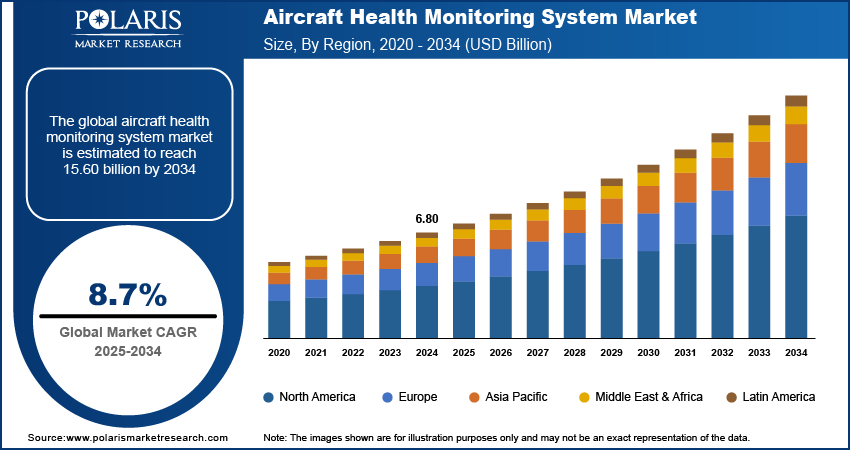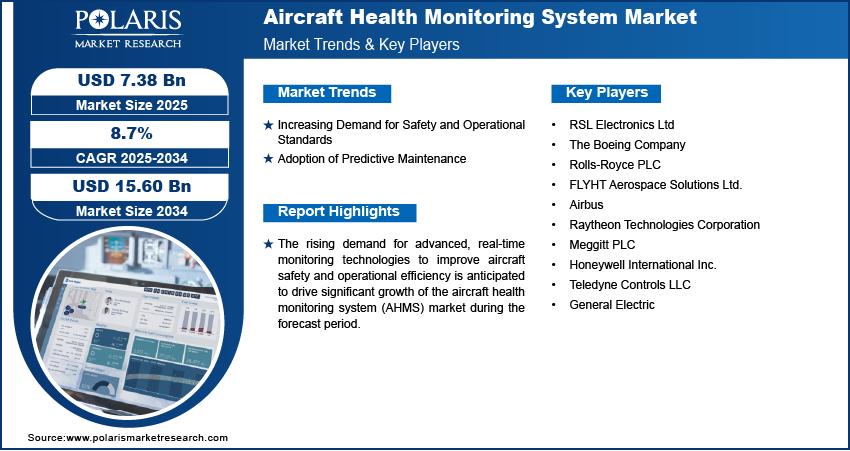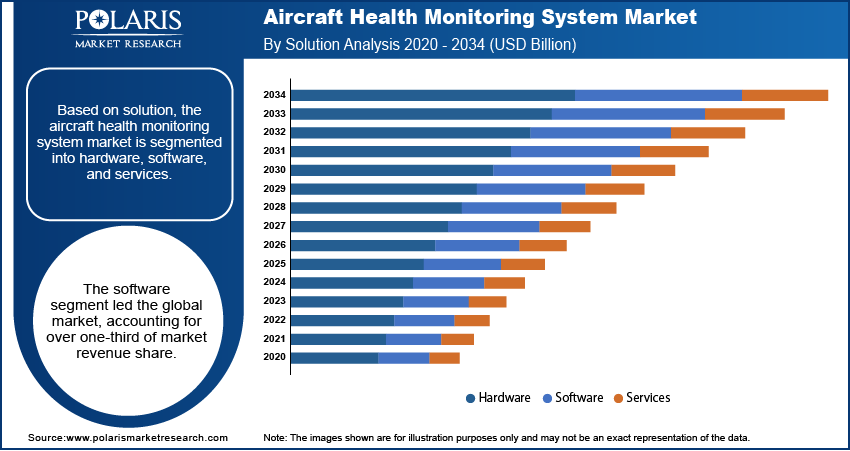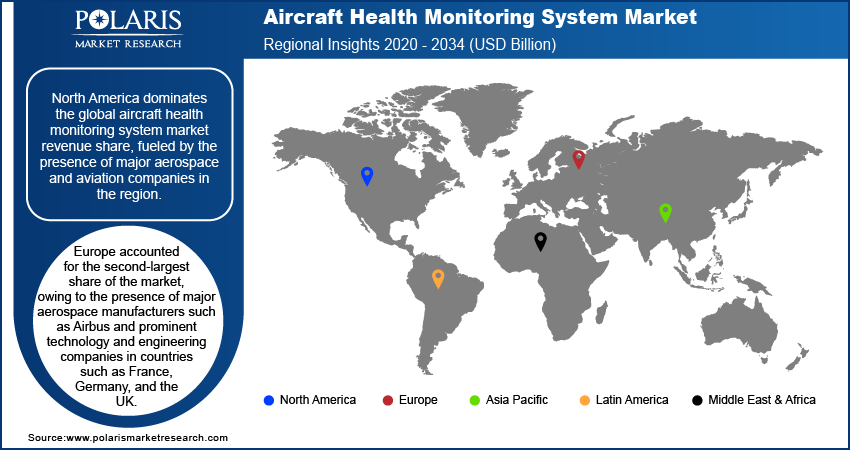
Aircraft Health Monitoring System Market Size, Share, Trends, Industry Analysis Report: By Type (Commercial Aviation and Military Aviation), Solution, End User, Aircraft Type, and Region (North America, Europe, Asia Pacific, Middle East & Africa, and Latin America) – Market Forecast, 2025–2034
- Published Date:Feb-2025
- Pages: 116
- Format: PDF
- Report ID: PM1576
- Base Year: 2024
- Historical Data: 2020-2023
Aircraft Health Monitoring System Market Overview
The global aircraft health monitoring system market was valued at USD 6.80 billion in 2024. The market is projected to grow from USD 7.38 billion in 2025 to USD 15.60 billion by 2034. It is projected to register a CAGR of 8.7% from 2025 to 2034.
An aircraft health monitoring system (AHMS) monitors and evaluates the condition of aircraft components in real time. It collects information from multiple sensors that observe essential systems such as engines, structures, and avionics, enabling early identification of possible problems. By facilitating predictive maintenance and timely action before failures occur, AHMS helps improve safety, streamline maintenance planning, lower expenses, and boost operational efficiency.

To Understand More About this Research: Request a Free Sample Report
The increasing focus on flight safety by aircraft manufacturing companies is driving the adoption of aircraft health monitoring systems. The rise in aerospace IT spending in emerging economies, along with advancements in workflow optimization and analytical systems, drives the aircraft health monitoring system market growth. Furthermore, the demand for real-time problem management, performance monitoring solutions, and customized alerts drives the market development.
The increasing adoption of predictive maintenance, driven by advanced product analytics and real-time sensor information, enables airlines to predict and avert failures, which helps decrease downtime, enhance efficiency, and reduce maintenance expenses. This is one of the major market trends anticipated to boost the aircraft health monitoring system market demand during the forecast period. The regulatory approval of new AHM solutions is expected to create AHMS market opportunities in the coming years.
Aircraft Health Monitoring System Market Dynamics
Increasing Demand for Safety and Operational Standards
The aviation industry is increasingly focusing on safety and maintenance. Aircraft health monitoring system promotes the safety of passengers, crew, and cargo by taking proactive steps that detect and resolve potential problems before they escalate. As technology advances, AHMS improves operational efficiency by offering airlines crucial insights into aircraft conditions, such as fuel usage and engine performance. This enables optimized maintenance planning, minimized downtime, and better fleet management, making AHMS essential for airlines aiming to stay competitive while maintaining high safety and operational standards. Therefore, the rising demand for safety and regulatory compliance propels the aircraft health monitoring systems (AHMS) market growth.
Adoption of Predictive Maintenance
The aircraft health monitoring industry is adopting predictive maintenance solutions to reduce maintenance costs, decrease downtime, and improve aircraft safety and dependability. This proactive approach utilizes data from AHMS to anticipate maintenance requirements before failures occur. By identifying possible problems early through data analytics, airlines can schedule maintenance more efficiently, minimizing unexpected incidents and prolonging component life. Predictive maintenance allows airlines to streamline operations, minimize interruptions, and enhance cost-effectiveness, ensuring sustained operational continuity and improved performance in the long term. Thus, the rising adoption of predictive maintenance by the aircraft health monitoring industry fuels the aircraft health monitoring systems (AHMS) market demand.

Aircraft Health Monitoring System Market Segment Insights
Aircraft Health Monitoring System Market Outlook Based on Solution
The aircraft health monitoring system market, by solution, is segmented into hardware, software, and services. The software segment led the global market in 2024, accounting for over one-third of market revenue. The dominance of the segment is attributed to the growing dependence on data analysis, machine learning, and artificial intelligence (AI) in the aviation industry.
Aircraft Health Monitoring System Market Assessment Based on Aircraft Type
The aircraft health monitoring system market, by aircraft type, is segmented into fixed-wing aircraft and helicopters. The fixed-wing aircraft segment leads the market, representing over 50% of the market revenue share. The market growth for the segment is driven by the greater prevalence and variety of fixed-wing aircraft in commercial and military fleets.
Aircraft Health Monitoring System Market Evaluation Based on End User
The aircraft health monitoring system market, by end user, is segmented into OEMs, MROs, and airlines. The airlines segment leads the market, representing over one-third of the market revenue share. Airlines manage and maintain extensive fleets of airplanes, emphasizing safety, reliability, and efficiency, which propels the demand for various safety and maintenance solutions such as aircraft health monitoring systems.

Aircraft Health Monitoring System Market Regional Analysis
The market report offers aircraft health monitoring system market insights into North America, Europe, Asia Pacific, Latin America, and the Middle East & Africa. North America dominates the market revenue share, fueled by the presence of major aerospace and aviation companies in the region. Major aircraft manufacturers, technology pioneers, and service providers are operating across the region, and prominent companies such as Boeing and Lockheed Martin are headquartered in the US. These major players are essential in promoting and implementing innovative aviation technologies, such as AHMS.
Europe accounted for the second-largest share of the aircraft health monitoring system (AHMS) market revenue in 2024. The regional market growth is propelled by the presence of major aerospace manufacturers such as Airbus and prominent technology and engineering companies in countries, including France, Germany, and the UK. The collaborative efforts within the European aviation industry, along with a significant focus on research and development, have led to ongoing progress in aviation technologies such as AHMS. Germany holds the largest share of the European AHMS market, whereas the UK has the fastest-growing market in the region.

Aircraft Health Monitoring System Market – Key Players and Competitive Insights
Leading market players are focusing on ongoing innovation to develop advanced and differentiated AHMS solutions. Furthermore, they are actively implementing various strategic initiatives to broaden their global reach, such as establishing strategic alliances, introducing new offerings, obtaining contractual agreements, participating in mergers and acquisitions, and pursuing significant investments. To thrive and stay competitive in a fast-growing market, market players need to provide innovative solutions that distinguish them.
The aircraft health monitoring system market report offers a market assessment of all key players such as RSL Electronics Ltd, The Boeing Company, Rolls-Royce PLC, FLYHT Aerospace Solutions Ltd., Airbus, Raytheon Technologies Corporation, Meggitt PLC, Honeywell International Inc., Teledyne Controls LLC, and General Electric.
List of Key Companies in Aircraft Health Monitoring System Market
- RSL Electronics Ltd
- The Boeing Company
- Rolls-Royce PLC
- FLYHT Aerospace Solutions Ltd.
- Airbus
- Raytheon Technologies Corporation
- Meggitt PLC
- Honeywell International Inc.
- Teledyne Controls LLC
- General Electric
Aircraft Health Monitoring System Industry Developments
December 2024: Firan Technology Group Corporation completed its acquisition of FLYHT Aerospace Solutions Ltd. under the Canada Business Corporations Act. FLYHT is now fully owned by FTG.
July 2024: Honeywell announced its acquisition of Air Products' Liquefied Natural Gas (LNG) Process Technology and Equipment Business, enhancing its energy transition capabilities. The contract establishes a comprehensive solution for global clients, enhancing expansion in aftermarket services, software, and sales while improving Honeywell's segment margins and adjusted EPS in the initial year.
Aircraft Health Monitoring System Market Segmentation
By Type Outlook
- Commercial Aviation
- Military Aviation
By Solution Outlook
- Hardware
- Software
- Services
By End User Outlook
- OEMs
- MRO
- Airlines
By Aircraft Type Outlook
- Fixed Wing Aircraft
- Helicopter
By Regional Outlook
- North America
- US
- Canada
- Europe
- Germany
- France
- UK
- Italy
- Spain
- Netherlands
- Russia
- Rest of Europe
- Asia Pacific
- China
- Japan
- India
- Malaysia
- South Korea
- Indonesia
- Australia
- Rest of Asia Pacific
- Middle East & Africa
- Saudi Arabia
- UAE
- Israel
- South Africa
- Rest of Middle East & Africa
- Latin America
- Mexico
- Brazil
- Argentina
- Rest of Latin America
Aircraft Health Monitoring System Market Report Scope
|
Report Attributes |
Details |
|
Market Size Value in 2024 |
USD 6.80 billion |
|
Market Size Value in 2025 |
USD 7.38 billion |
|
Revenue Forecast by 2034 |
USD 15.60 billion |
|
CAGR |
8.7% from 2025 to 2034 |
|
Base Year |
2024 |
|
Historical Data |
2020–2023 |
|
Forecast Period |
2025–2034 |
|
Quantitative Units |
Revenue in USD billion and CAGR from 2025 to 2034 |
|
Report Coverage |
Revenue Forecast, Market Competitive Landscape, Growth Factors, and Trends |
|
Segments Covered |
|
|
Regional Scope |
North America Europe Asia Pacific Latin America Middle East & Africa |
|
Competitive Landscape |
|
|
Report Format |
PDF + Excel |
|
Customization |
Report customization as per your requirements with respect to countries, regions, and segmentation. |
FAQ's
The AHMS market size was valued at USD 6.80 billion in 2024 and is projected to grow to USD 15.60 billion by 2034.
The market is projected to register a CAGR of 8.7% from 2025 to 2034.
North America accounted for the largest region-wise market size in 2024.
RSL Electronics Ltd, The Boeing Company, Rolls-Royce PLC, FLYHT Aerospace Solutions Ltd., Airbus, Raytheon Technologies Corporation, Meggitt PLC, Honeywell International Inc., Teledyne Controls LLC, and General Electric are a few key players in the market.
The software segment dominated the market share in 2024.
The fixed-wing aircraft segment dominated the market in 2024.
